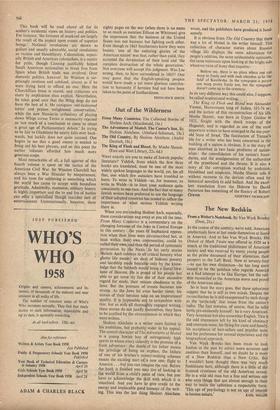The New Redskin
From a Writer's Notebook. By Van Wyck Brooks. (Dent, 21s.) IN the course of the century, we're told, American intellectuals have at last made themselves at hom' in America. And so has Van Wyck Brooks. His Ordeal of Mark Twain was offered in 1920 as a smack at the traditional philistinism of American society and was received by many young people as the prime document of their alienation, their passport to the Left Bank. Now 'at seventy-four —to use his own distinction—he has long since
• ceased to be the paleface who regards America as a bad attempt to be like Europe, but the red- skin reconciled to the American norm and proud of the American ideal.
So at least the story goes. But these aphorisms suggest that he is still in two minds. Despite the reconciliation he is still exasperated by such things as the 'turtle-talk' that issues from the nation's radio. The fact remains, of course, that he tallth turtle pre-eminently himself : he is very American. Very American but also somewhat English. This is the odd impression left by his kind of obstinacy and common sense, his liking for caste and family, his acceptance of best-sellers and popular taste, and his preference for normal experience and the biographical approach. •
Van Wyck Brooks has been made to look foolish in the past by critics more accurate and cautious than himself, and no doubt he is more of a New Redskin than a New Critic. But I wouldn't have thought there was very much foolishness here, although there is a little of the licensed crustiness of the old American savant. He is a wild old man but a fine and serious one who says things that are almost enough in-their way to make the aphorism a respectable form. 'This age of psychology is not an age of interest


































 Previous page
Previous page